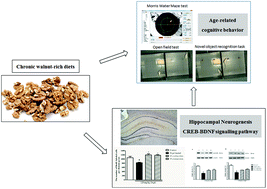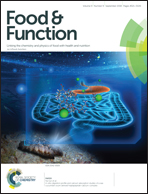Walnut diets up-regulate the decreased hippocampal neurogenesis and age-related cognitive dysfunction in d-galactose induced aged rats
Abstract
Recently, dietary intervention has been considered as a prospective strategy in delaying age-related cognitive dysfunction and brain plasticity degeneration. This study explored the effect of walnut diets (6% and 9%, 8 weeks) on cognitive behavior, hippocampal neurogenesis and the neurotrophic signaling pathway in D-galactose (D-gal) model rats. Behavioral tests showed that walnut diets significantly reversed spatial memory loss in the Morris water test, locomotor activity deficiency in an open field test, and a recognition behavior reduction in a novel object recognition task. Immunohistochemistry analysis demonstrated walnut diets significantly increased the hippocampal neurogenesis in D-gal model rats. Moreover, western blot results indicated that walnut diets reserved a D-gal induced decrease of hippocampal pCREB (Ser133) and BDNF expression, two crucial intracellular molecules involved in hippocampal neurogenesis. These findings confirmed that chronic walnut-rich diets could ameliorate cognitive dysfunction in D-gal model rats, and the up-regulation of neurogenesis, as well as the expression of pCREB and BDNF in hippocampus, may be one of the molecular and cellular mechanisms underlying these effects.



 Please wait while we load your content...
Please wait while we load your content...